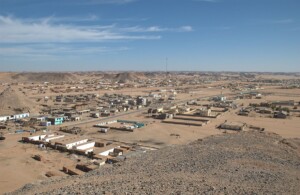Sudan junta blocks judiciary appointments
Members of the Forces for Freedom and Change (FFC) and lawyers have expressed surprise at the refusal of the Sudan junta to nominate Abdelgadir Mohamed Ahmed as head of the judiciary and Mohamed El Hafiz as Attorney General along with three assistants. The junta claims that the Constitutional Declaration stipulates that candidates for these posts should be selected by the Supreme Judicial Council. The TMC itself has removed and appointed persons for these positions several times during its rule.
 Abdelgadir Mohamed Ahmed, proposed head of the judiciary, and Mohamed El Hafiz, proposed Attorney General.
Abdelgadir Mohamed Ahmed, proposed head of the judiciary, and Mohamed El Hafiz, proposed Attorney General.
Members of the Forces for Freedom and Change (FFC) and lawyers have expressed surprise at the refusal of the Sudan junta to nominate Abdelgadir Mohamed Ahmed as head of the judiciary and Mohamed El Hafiz as Attorney General along with three assistants. The junta claims that the Constitutional Declaration stipulates that candidates for these posts should be selected by the Supreme Judicial Council. The TMC itself has removed and appointed persons for these positions several times during its rule.
A statement issued by the Democratic Lawyers Alliance affirmed its commitment to the FFC selection of Abdelgadir Mohamed Ahmed as Chief Justice, and Mohamed El Hafiz as Attorney General of Sudan, because of their competence, independence, and professional and moral integrity.
The alliance accused the junta of intentionally introducing a number of people with roots in the former regime among the newly promoted and nominated judges. “Since the ousting of Al Bashir, the Supreme Judicial Council has been fortified with judges loyal to the military TMC and the defunct regime, disrupting the restoration of the Rule of Law and the exposing of corruption.”
Former Judges Association
The Former Judges Association also confirmed in a statement on Tuesday its adherence to the nomination of Mohamed Ahmed and Mohamed El Hafiz. “The TMC’s refusal to agree on Mohamed Ahmed, proposed by the FFC as head of the judiciary, is a serious blow and a set back from fulfilling an important part of the December Revolution”.
According to the former judges the motive for the rejection was not the public interest or stipulations in the Constitutional Declaration. “Unfortunately the real motive was that elements of the Muslim Brotherhood and the National Congress Party [headed by the deposed president Al Bashir], who infiltrated the judiciary during the course of 30 years, want to protect their illegitimately acquired interests.”
“The second reason for the rejection is that these elements fear a Chief Justice who is honest and impartial and wants the justice system to function on the ground, in order to restore the confidence of the Sudanese people in its judiciary and to provide for fair trials for anyone accused of an offence.”
Nail in the coffin
The statement further said that the rejection of the junta of the two candidates seems to become “the first nail in the coffin of the desired democratic transformation. The deep state that overthrew the independence of the judiciary is still working hard to hijack and kill the December Revolution.”
According to the lawyers, a procedural error in the Constitutional Declaration relating to the appointment of the Chief Justice and his deputy is what caused the return of the crisis between the junta and the FFC.
The constitutional document, signed by the TMC and FFC last Saturday, states that the Chief Justice and the Attorney General are elected by the Supreme Judicial Council and the Public Prosecution Council. According to lawyers, the appointments are currently impossible because the members of both these councils are affiliated with the former regime.
Our editorial independence means that we can continue to provide factual updates about political developments to Sudanese and international actors, educate people about how to avoid outbreaks of infectious diseases, and provide a window to the world for those in all corners of Sudan. Support Radio Dabanga for as little as €2.50, the equivalent of a cup of coffee.












 and then
and then